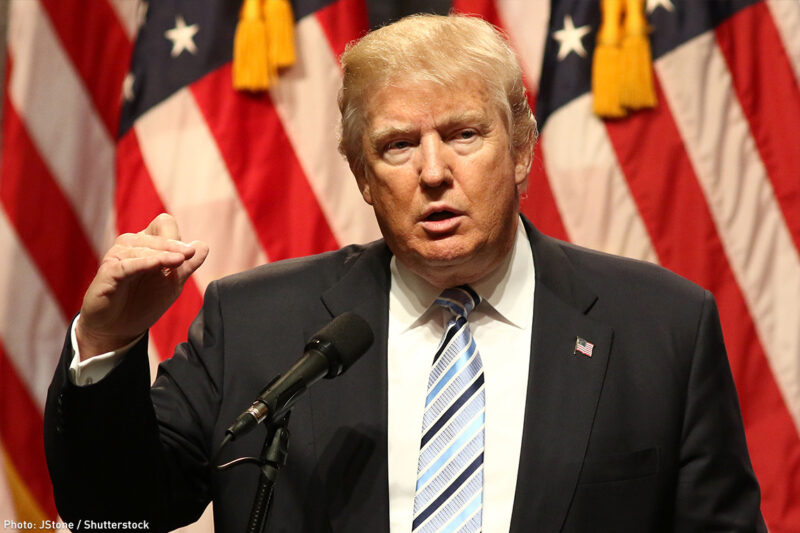Trump's Wiretapping Accusations: Here's What the Government Can Actually Do


On Saturday morning, President Donald Trump posted a series of angry , accusing former President Barack Obama of engaging in a “Nixon/Watergate”-style plot to tap the phones at Trump Tower during the election.
As an initial matter, it’s important to emphasize that little has actually been reliably verified. While many critical details remain unknown, portions of President Trump’s statements seem consistent with that, prior to the election, the FBI sought to surveil members of the Trump campaign team under the Foreign Intelligence Surveillance Act (FISA). That law, passed by Congress in 1978 to prevent abuses of executive power, allows the government to surveil foreign powers and their agents with the approval of a secret court.

Given Trump’s claims, the ongoing investigations into his campaign’s ties with Russia, and the confusion and speculation that Trump’s tweets have caused, it’s crucial to understand how FISA surveillance actually works.
In 1978, largely in response to unlawful and improper surveillance by the executive branch, Congress passed FISA to regulate surveillance conducted for foreign intelligence purposes. Under FISA, when the government seeks to conduct certain types of surveillance on U.S. soil, it is generally required to apply for and obtain an individualized order from a judge on the FISA Court. If an American is the target of the surveillance, that application must be reviewed and approved by the attorney general before it goes to the FISA Court.
In order to authorize the wiretapping, the FISA Court judge must find — based on evidence presented in the application — that there is probable cause to believe that the “target” of the surveillance is a foreign power or agent of a foreign power. The judge must also find probable cause to believe that the phone line, email account, or computer where the surveillance will occur is being used by a foreign power or agent of a foreign power. Individuals who are in contact with the government’s target may have their communications swept up too, though the government must apply court-approved procedures, known as “minimization” procedures, to limit the intrusion into Americans’ privacy.
Despite Congress’s laudable aims in enacting FISA originally, the ACLU has long argued that surveillance under FISA raises serious constitutional concerns, because FISA orders are not nearly as protective as wiretapping warrants in criminal cases. With a traditional wiretap, the government must establish probable cause that its surveillance will lead to evidence of a crime, and strict minimization rules are applied to protect the privacy of non-targets whose information could get swept up by the wiretap. With FISA surveillance, the government need only establish that there’s probable cause to believe that its target is an agent of a foreign power and is using a particular phone line, email account, or other communications “facility.” In addition, the purpose of FISA surveillance — to obtain wide-ranging “foreign intelligence information” — is much broader than a typical wiretap, and can extend, for example, to information related to the foreign affairs of the United States. Those are extremely broad parameters. Finally, the minimization rules under FISA are far less protective of Americans’ privacy interests.
So, how does this surveillance statute mesh with recent news reports and President Trump’s tweets?
The Guardian that, last summer, the FBI sought an order from the FISA Court for permission to monitor four members of the Trump campaign team suspected of “irregular contacts” with Russian officials. Reports suggest that the initial application was denied — a detail President Trump appears to have in his tweets. But, according to other , a judge on the FISA Court eventually granted a narrower surveillance application in October 2016. While these accounts all indicate that the FBI relied on FISA to conduct its spying, we don’t know exactly whom the FBI sought to target or on what grounds. One suggests that the government ultimately obtained permission to target individuals or entities in Russia who were believed to be communicating with then-candidate Trump and at least three other members of the Trump campaign. Because the identities of the “targets” named in the wiretap order are still unknown, it’s unclear whom, exactly, the FISA Court found to be a foreign agent when it authorized the surveillance.
Regardless of who the target was, however, it is critical to note that this FISA surveillance would have been individually approved by a court and could not simply have been conducted on President Obama’s order — a in a statement released over the weekend by a spokesperson for the former president. Indeed, that was the very type of abuse that FISA was enacted to prevent.
There is no doubt we need more information to shed light on what did and did not happen. But one thing is clear. Anyone genuinely concerned about the unconstitutional surveillance of Americans should turn their attention to reforming one especially problematic section of FISA: Section 702, which the government relies on to surveil Americans’ international communications. Unlike “traditional” FISA, which at least requires the government to obtain an individualized court order to conduct surveillance, Section 702 authorizes the warrantless surveillance of vast quantities of international communications, with virtually no judicial oversight.
Assisted by companies like Facebook, Google, AT&T, and Verizon, the government uses this law to monitor Americans’ communications with foreigners abroad. In doing so, the government sweeps up billions of international emails, web-browsing activities, and phone calls — which NSA, CIA, and FBI analysts can then sift through looking for information about Americans. While there have been no public indications of this to date, it’s possible that Section 702 surveillance also captured communications between the Trump campaign team and the same Russian entities abroad.
Section 702 is set to expire at the end of the year, unless Congress renews it. Instead, Congress must reform this law, which harms the privacy rights both of people abroad and virtually all Americans.

